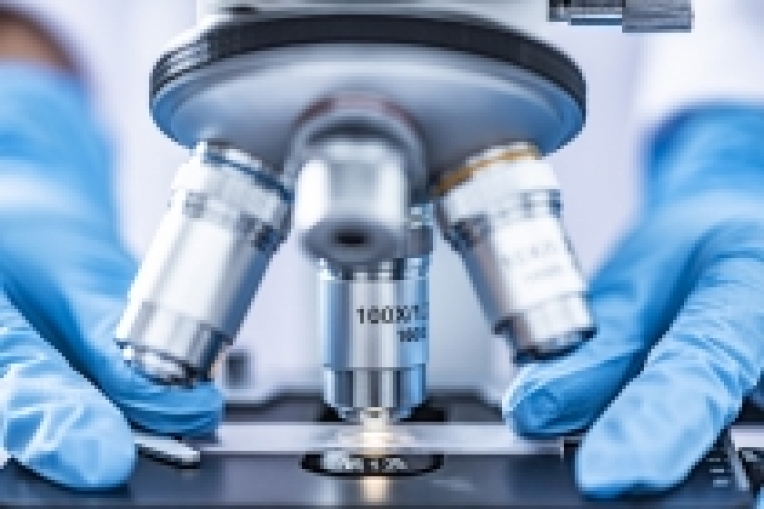Policy Lates
Policy Lates brings a panel of experts together for an informal debate on a contemporary science policy topic, with plenty of time for audience questions. If you have an idea for a Policy Late discussion, please get in touch, via policy@rsb.org.uk
For more policy news, sign up to our weekly Science Policy Newsletter through mySociety.
Past events
What bioscience skills are needed?
Wednesday 23 November | 18:30-20:00 | Online - Zoom

Biological research and innovation are evolving. New ways of doing biological science, enabled by advanced digital technologies, systems thinking, and engineering biology, for example, are emerging. This is alongside new expectations for the sector to address challenges for health, sustainable development and economic benefit.
The next generation of bioscientists need the skills to tackle the sector's future challenges. According to a 2018 Nuffield report, only 32% of UK bioscience undergraduates go on to work in the sector. Promoting transerrable skills and increasing emphasis on inter-, multi- and trans-disciplinary work can push discoveries to new frontiers.
In this Policy Lates, we heard perspectives on what bioscience skills are needed for the future, and how scientists can be inclusive of, and responsive to, the values of the global society, from a panel of experts.
Panel
Chair - Professor Jon Scott FRSB, professor of bioscience education at the University of Leicester
Dr Parvez Alam FRSB, senior lecturer at the University of Edinburgh
Dr Hephzi Tagoe, founding director of GhScientific
Dr Kate Barclay, skills strategy consultant at UKBIA
Contact
For all enquiries, please contact events@rsb.org.uk
Event supporters
This event was kindly supported by Applied Microbiology International, the Biochemical Society, the British Pharmacological Society, Applied Microbiology International, and The Physiological Society.
Further resources
- Read the Nuffield Foundation's Report (2018) on career trajectories for STEM graduates
- Read our Future Skills for the Life Sciences conference report (2019)
- Find out about the new technologies that are changing the future of biology in this Nature article (2021), Science Direct publication (2022), and Pharmajobs article
- Read about the future role of 'human' skills and interdisciplinary science in blog post by the University of Oxford's Mark Roberts (2020) and Physiological Society's magazine article.
- Attend the Society for Experimental Biology's symposium Decolonising and Diversifying Biosciences Education on Monday 19 to Tuesday 20 December in Cambridge.
- Attend The Physiological Society's Early Career Life Scientists' Symposium on Thursday 24 November at the University of Manchester.
Tackling inequity in clinical research
Tuesday 20 September | 18:30-20:00 | Online - Zoom
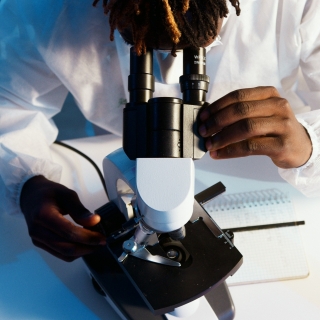 The importance of good clinical trials has been particularly visible to the public with the emergence of COVID-19 and the work undertaken to research and develop vaccines and therapeutics. Devastatingly, the pandemic has also laid bare the inequalities in health outcomes among different communities in our society. To better understand and tackle inequalities of the research system, we must address participant diversity in clinical research, and how barriers to this can be overcome.
The importance of good clinical trials has been particularly visible to the public with the emergence of COVID-19 and the work undertaken to research and develop vaccines and therapeutics. Devastatingly, the pandemic has also laid bare the inequalities in health outcomes among different communities in our society. To better understand and tackle inequalities of the research system, we must address participant diversity in clinical research, and how barriers to this can be overcome.
This event focussed on clinical trials and population studies, and explored how addressing inequity in clinical research design can benefit public health and wellbeing. An expert panel covered innovative initiatives, research funding incentives and policies that support equitable research design.
Panel
Chair - Professor Winston Morgan FRSB, director of impact & innovation, School of Health Sport and Bioscience, University of East London
Professor Catriona Waitt, professor of clinical pharmacology and global health, University of Liverpool
Dr Maria Augusta Arruda, head of researcher development, University of Nottingham
Dr Marie Fisk, clinical lecturer, University of Cambridge
Event supporters
This event was kindly supported by the Biochemical Society, the British Pharmacological Society, Applied Microbiology International, the Society for Experimental Biology, and The Physiological Society.
Further resources
- Read articles from Physiological News Magazine Diversity and Inclusion in Science and Health (2019) by Lilian Hunt and Sex in Studies (2020) by Natasha Karp, Rohit Katial, and Karen Thacker.
- Read The Physiological Society's blog post Debunking Common Myths and Biases About Biological Sex-based Variables in Pre-clinical Research Subjects (2021) by Jessica Breznik, Dawn Bowdish, and Deborah Sloboda.
- Read article from the British Pharmacological Society - What do we currently know about who is benefiting from pharmacology research?
- Read British Journal of Pharmacology report Sex bias in preclinical research and an exploration of how to change the status quo by Natasha Karp and Niel Reavey (2018)
- Read recent article Ensuring diversity in clinical trials: The role of clinical pharmacology (2022) by Joanna Masters, Jack Cook, and others
- Read statement from Pfizer: Diversity in Our Clinical Trials
- Read Analysis by Natalie Healey, Pharmaceutical Technology: How Covid-19 has put clinical research's diversity problem in the spotlight (2020)
Can One Health prevent pandemics?
Tuesday 19 July | 18:30-20:00 | Online - Zoom
 This online panel discussion explored how a One Health approach can be integrated into research and policy, for prevention of and response to future pandemics. The expert panel of speakers discussed the challenges and possible solutions facing One Health researchers in carrying out research and advice to policymakers, alongside those facing policymakers in integrating One Health evidence and expertise into policymaking processes.
This online panel discussion explored how a One Health approach can be integrated into research and policy, for prevention of and response to future pandemics. The expert panel of speakers discussed the challenges and possible solutions facing One Health researchers in carrying out research and advice to policymakers, alongside those facing policymakers in integrating One Health evidence and expertise into policymaking processes.
This event was chaired by Professor Louise Cosby FRSB, head of virology, Agri-Food and Biosience Institute Northern Ireland, and honorary professor of microbiology at Queen's University Belfast.
Panel
Chair - Professor Louise Cosby FRSB, head of virology, Agri-Food and Bioscience Institute Northern Ireland, and honorary professor of microbiology, Queen's University Belfast
Dr Wendy Harrison, CEO, SCI Foundation
Dr Helen Roberts, Policy lead for non-livestock diseases, risk and science, Defra
Dr Chadia Wannous, Global One Health Coordinator, World Organisation for Animal Health
Coverage
Read the event news story and watch the full event recording on the RSB YouTube channel.
Event supporters
This event was kindly supported by the Biochemical Society, the British Pharmacological Society, the Applied Microbiology International, the Society for Experimental Biology, and The Physiological Society.
Why protect ocean biodiversity?
Monday 15 November | 18:30-20:00 | Online - Zoom
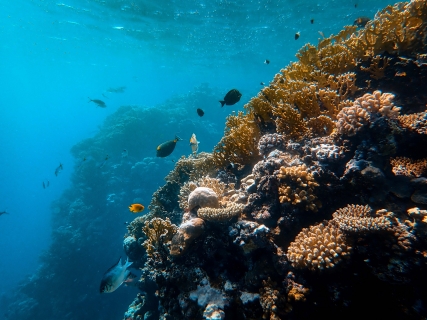
In recent times people have experienced a shift in how they perceive the natural world and their dependence on it. Oceans cover 70% of the earth's surface, yet they continue to be the least explored and most endangered, with only 7% of the world's ocean under protection. Ocean biodiversity is a vital part of the global system we depend upon, and if we are to continue to benefit from marine resources, we need to explore new ways of preserving them.
This event explored specific examples of the value of marine biodiversity to people, including the interactions between the marine environment and the global climate. It also explored the social and policy challenges of developing international conservation targets for the world's oceans.
Panel
Professor Melanie Austen FRSB, professor of ocean and society, University of Plymouth - panel chair
Professor Carole Llewellyn, professor in applied aquatic bioscience, University of Swansea
Steven Lutz, senior programme officer of blue carbon lead, GRID-Arendal
Professor Elisa Morgera, professor of global environmental law, University of Strathclyde
Coverage
Read the event news story and watch the full event recording on the RSB YouTube channel.
Event supporters
This event was kindly supported by the Biochemical Society, the British Pharmacological Society, the Applied Microbiology International, the Society for Experimental Biology, and The Physiological Society.
Biology Week: Rethinking our food system
Monday 4 October | 18:30-20:15 | Online - Zoom
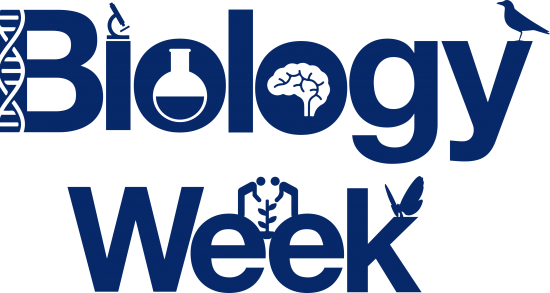 Perhaps more than at any other time in our recent history, humans are aware that the negative impacts we have on the natural environment directly affect our health and wellbeing. Climate change and the COVID-19 pandemic are putting huge pressure on global food supply chains, along with changing habits and demands from socially-distanced populations. In order to recover sustainably, and be prepared for what the future has in store, we need to explore ways to create a resilient food system by looking at what we produce, and how.
Perhaps more than at any other time in our recent history, humans are aware that the negative impacts we have on the natural environment directly affect our health and wellbeing. Climate change and the COVID-19 pandemic are putting huge pressure on global food supply chains, along with changing habits and demands from socially-distanced populations. In order to recover sustainably, and be prepared for what the future has in store, we need to explore ways to create a resilient food system by looking at what we produce, and how.
In this event, our panel of expert speakers discussed the complex development of food policy nationally and internationally. They charted the balancing act this involves, bringing in needs for food security, reversing biodiversity loss and achieving net zero greenhouse gas emissions targets.
Panel
Tamsin Cooper, director, National Food Strategy
Ruth Edge, chief food chain adviser, National Farmers' Union
Coverage
Read the event news story and watch the full event recording on the RSB YouTube channel.
Event supporters
This event was kindly supported by the Biochemical Society, the British Pharmacological Society, the Applied Microbiology International, the Society for Experimental Biology, and The Physiological Society.
Further resources
- Search ‘food’ within our free Policy Resource Library for food policy resources from the RSB and our Member Organisations
- Read Part One of the National Food Strategy
- Read a recent report published in Nature Food (2021): Scenarios for transforming the UK food system to meet global agreements, Maia Elliot and Riaz Bhunnoo
Translating potential into progress - COVID-19 vaccines
Tuesday 25 May | 18:30-20:30 BST | Online - Zoom
 Our panel of speakers discusses translational research successes and lessons learned in COVID-19 vaccines development. They considered the ongoing challenges presented by SARS-CoV-2 variants, drawing-out the consequences for our fight against COVID-19, particularly via translational research on vaccines. To conclude, they reflected on what implications these successes, lessons and challenges hold, for the innovation and translational research potential of the biosciences in improving global health more broadly.
Our panel of speakers discusses translational research successes and lessons learned in COVID-19 vaccines development. They considered the ongoing challenges presented by SARS-CoV-2 variants, drawing-out the consequences for our fight against COVID-19, particularly via translational research on vaccines. To conclude, they reflected on what implications these successes, lessons and challenges hold, for the innovation and translational research potential of the biosciences in improving global health more broadly.
Panel
Associate Professor Teresa Lambe, Associate Professor and Jenner Investigator, the Jenner Institute, Oxford University
Dr Megan MacLeod, Senior Lecturer in Immunology, University of Glasgow
Coverage
Read the event news story and watch videos on the RSB YouTube channel.
Event supporters
This event is kindly supported by the Biochemical Society, the British Pharmacological Society, the Applied Microbiology International, the Society for Experimental Biology, and The Physiological Society.
Further resources
The following non-exhaustive list offers further resources relating to the topic of this event:
- RSB COVID-19 bulletin - covering the latest news and science behind the outbreak and the response. Read the latest issue and subscribe.
Bridging the Gap - Supporting students through educational transition
Thursday 22 April | 18:30-20:30 BST | Online - Zoom
 For those who choose to move from secondary to tertiary education, and from there to a post-graduate role to start a career, the change can be significant, with long-term implications. Greater understanding is needed of the challenges people making these choices face, alongside development and measurement of inclusive support programmes, to make moving to the next stage in their education or career fair, positive and secure.
For those who choose to move from secondary to tertiary education, and from there to a post-graduate role to start a career, the change can be significant, with long-term implications. Greater understanding is needed of the challenges people making these choices face, alongside development and measurement of inclusive support programmes, to make moving to the next stage in their education or career fair, positive and secure.
Our panel will discuss challenges and support opportunities for students and graduates as they experience these transitional steps, and different career paths.
Panel
Dr Philip Young FRSB, associate professor, life sciences, University of Warwick - panel chair
Dr Katharine Hubbard, reader in biology education, University of Hull
Daniele Acquisto AMRSB, associate scientist, GSK
Professor Rory Duncan, director for talent and skills, UKRI
Coverage
Read the event news story and watch videos on the RSB YouTube channel.
Event supporters
This event is kindly supported by the Biochemical Society, the British Pharmacological Society, the Applied Microbiology International, the Society for Experimental Biology, and The Physiological Society.
Further resources
The following non-exhaustive list offers further resources relating to the topic of this event, and will be added to prior to the event.
- Oxford Biology Primers: Published by Oxford University Press in partnership with the Royal Society of Biology, the Oxford Biology Primers series introduces prospective and current students of undergraduate-level bioscience to a broad range of topics from this dynamic experimental science.
- RSB Apprentice of the Year Award in recognition of outstanding individuals and the contributions apprentices make to the workforce
Climate crisis - biosciences for a state of emergency
Monday 23 November 2020 | 18:30-20:30 GMT | Online - Zoom

In 2021, the UK will host the United Nations Climate Change Conference (COP26) in Glasgow 1-12 November, creating an opportunity for the UK to demonstrate leadership and increase global ambition on tackling climate change.
The biosciences are key to climate change mitigation and adaptation, from land use and food production through to impacts on biodiversity, health and disease.
In the build-up to COP26, this Policy Lates event explored the role of biosciences in keeping the global temperature rise this century to well below 2 degrees Celsius above pre-industrial levels and pursuing efforts to limit the temperature increase even further to 1.5 degrees Celsius in line with the Paris agreement.
Panel
Dr Julia Knights FRSB, Deputy Director at the Science Museum - panel chair
Professor Pete Smith FRSB, Professor of Soils & Global Change, University of Aberdeen
Dr Carol Turley OBE, Senior Scientist, Plymouth Marine Laboratory
Nigel Topping, UK High Level Climate Action Champion
Coverage
Read the event news story and watch videos on the RSB YouTube channel.
Event supporters
This event was kindly supported by the Biochemical Society, the British Pharmacological Society, the Applied Microbiology International, the Society for Experimental Biology, and The Physiological Society.
Biology Week: Healthy Ageing
Monday 5 October 2020 | 18:30-20:30 BST | Online - Zoom

Panel
Dr Richard Siow FRSB, director of Ageing Research at King's (ARK) and advisory board member of the All Party Parliamentary Group for Longevity - panel chair
Professor David Llewellyn, professor of clinical epidemiology and digital health, University of Exeter
Dr Lauren Walker, NIHR Academic Clinical Lecturer in Clinical Pharmacology and Therapeutics, University of Liverpool
George MacGinnis, challenge director, healthy ageing, UK Research and Innovation
Coverage
Read the event news story and watch videos on the RSB YouTube channel.
Event supporters
This event was kindly supported by the Biochemical Society, the British Pharmacological Society, the Applied Microbiology International, the Society for Experimental Biology, and The Physiological Society.
Discovery research in the era of COVID-19
Wednesday 12 August 2020 | 18:30-20:30 BST (GMT+1) | Online - Zoom
Discovery research can be defined as basic or fundamental research that is curiosity-driven, rather than research that has a direct application and is heavily guided by wider strategic priorities. The delivery and implementation of discovery research outcomes has led to wide-ranging economic and social benefits.
This event brought together specialists involved in the funding, infrastructure, delivery and outcomes of discovery research. Talks focussed on strategies and policies currently in place to drive the discovery of medicinal products, to enable prophylaxis and treatment of COVID-19, alongside the response to other human diseases.
The panel discussed how the pandemic has, and may continue to, remodel the discovery research landscape. They considered what can be done, in an equitable and sustainable way, to meet the challenges and benefit from the opportunities this important area of research brings for our society.
Panel
Professor Jackie Hunter CBE FBPharmacolS FRSB, BenevolentBio - Panel Chair
Steve Bates OBE, BioIndustry Association
Dr Curtis Asante, Cancer Research UK
Coverage
Read the event news story and watch videos on the RSB YouTube channel.
Event supporters
This event was kindly supported by the Biochemical Society, the British Pharmacological Society, the Applied Microbiology International, the Society for Experimental Biology, and The Physiological Society.
Antimicrobial resistance - A One Health approach
Wednesday 20 May 2020 | 19:00-21:00 BST (GMT+1) | Online - Zoom
Antimicrobial resistance (AMR) occurs when a microorganism gains the ability to survive treatment with an antimicrobial drug. This phenomenon compromises our ability to treat a range of infectious diseases, leading to high levels of risk for patients and increased pressure on healthcare systems.
AMR is an ongoing threat that affects our health, our food supplies, and our environment. As the severity of the issue increases and many are declaring the arrival of a “post antibiotic era”, global organisations are advocating the One Health approach to tackle this major problem.
One health approaches are also key to respond to, mitigate and prevent spill-over of emerging infectious diseases from animal populations, as in the case of SARS-CoV-2, the virus currently causing the COVID-19 pandemic.
Our panel members also discussed the current (as of May 2020) COVID-19 pandemic response in the context of how strategies and policies needed to tackle AMR intersect with those needed to respond to COVID-19 now, and to prevent future pandemics.
Panel
Professor Paul Hoskisson FRSB, University of Strathclyde - Panel Chair
Dr Osman Dar, Chatham House
Professor Katharina Stark, Swiss Federal Food Safety and Veterinary Office
Becky Sugden, Wellcome Trust
Dr Sanjay Patel, University Hostpital Southampton
Coverage
Read the event news story and watch it on our YouTube channel.
Event supporters
This event was kindly supported by the Biochemical Society, the British Pharmacological Society, the Applied Microbiology International, the Society for Experimental Biology, and The Physiological Society.
Insect declines in the headlights
Mon 7 Oct 2019 | 19:00-22:00
Royal College of Physicians, 11 Saint Andrews Place, Regent's Park, London NW1 4LE
 Insects have hit the headlines recently. Studies suggesting declines at national and global scales have been described in terms of ‘armageddon' and ‘apocalypse' - but what is the reality, and what can we do about it?
Insects have hit the headlines recently. Studies suggesting declines at national and global scales have been described in terms of ‘armageddon' and ‘apocalypse' - but what is the reality, and what can we do about it?
This event explored the evidence behind the headlines. We considered what we know about insect declines and what we don't know, to better understand the causes and consequences of insect population changes. Our expert panel discussed how we monitor and conserve this vital and diverse group of organisms, while addressing challenges such as crop protection and control of pest species.
Panel
Professor Adam Hart, University of Gloucestershire - Panel Chair
Professor Chris Thomas, Royal Entomological Society and University of York
Dr Nick Isaac, Centre for Ecology & Hydrology
Dr Larissa Collins, Fera Science Ltd.
Dr Lynn Dicks, University of East Anglia
Coverage
Read our event news story and see highlights on our Twitter Moments.
Event supporter
This event was kindly supported by the Royal Entomological Society.
Biosciences for All - Paving Pathways for Diversity
Mon 8 Oct 2018 | 18:00-21:00 | Charles Darwin House, 12 Roger Street, London WC1N 2JU
This free Policy Lates event discussed ways to best support an inclusive and accessible environment, across the biosciences. Guests heard from innovators who are developing ways to improve access and support for people from diverse backgrounds to study and work in the biosciences. Guests learnt about the benefits created for people from a range of backgrounds, communities and experiences.
Panel
Dr David McAllister CBiol FRSB, UK Research and Innovation - BBSRC (Chair) (Watch on YouTube)
Racheal Adelodun, Sarah Cannon Research Institute (Watch on YouTube)
Dr Saher Ahmed, Wellcome Trust Sanger Institute (Watch on YouTube)
Dr Anne-Marie Coriat, Wellcome Trust (Watch on YouTube)
Professor Sara Rankin FRSB, Imperial College London (Watch on YouTube)
Dr Carole Thomas, John Innes Centre (Watch on YouTube)
Anthony Wynne, The Daphne Jackson Trust (Watch on YouTube)
Read our event news story, see highlights on our Twitter Moments and watch talks filmed by the Biochemical Society on YouTube.
Supporters
This event was run with support from the Biochemical Society.
A meeting of minds: the biology of mental health
Tuesday 10 October 2017 18:00-21:00
Improving people’s wellbeing is perhaps the ultimate goal of almost all government policy. Mental health is a major driver of wellbeing, yet one in four people in the UK suffer from a mental health problem each year, with enormous cost to individuals and society. Treatment for mental health has historically been deemed a lower priority than physical health, but in the last few years, NHS England has stated in its Mandate the commitment to “put mental health on a par with physical health”.
Further, in January 2017 the Prime Minister unveiled plans to transform mental health support. Policy Lates will examine the biology that underpins mental health and how this can inform policy to improve wellbeing.
Expert panel
Professor Jeremy Pritchard CSciTeach FRSB, University of Birmingham (Chair)
Dr Valerie Gladwell, University of Essex
Dr Karen Mifsud, University of Bristol
Professor Barbara Sahakian FRSB, University of Cambridge
Professor Clare Stanford FRSB, University College London
Read our event news story and watch it on the Biochemical Society Facebook page.
Supporters
This event was run with support from the Biochemical Society, as well as the British Ecological Society and The Physiological Society - which this year has had a focus on making sense of stress.
Tackling antimicrobial resistance crisis: what roles will regulation & innovation play?
Monday 10 October 2016 18:00-20:00
Earlier this year, a review on antimicrobial resistance (AMR) by Lord Jim O'Neill set out a comprehensive action plan for the world to prevent the spread of infectious diseases, develop new rapid diagnostics tools and incentivise research into new antibiotics.
According to the report, if not tackled urgently, antimicrobial resistance could kill 10 million people a year by 2050, the equivalent of 1 person every 3 seconds; more than cancer kills today.
As a part of the Biology Week, this Policy Lates event examined the roles of innovation and regulation in tackling the AMR crisis from different perspectives, including veterinary research, biotechnology and public health.
Expert panel
Professor Jeff Cole, Vice President, European Federation of Biotechnology (Chair)
John Broughall, Antibiotic Research UK
Professor Mark Fielder, Kingston University
Tamar Ghosh, Lead, Longitude Prize, Nesta
Further information
The event was run by the UK members of the European Federation of Biotechnology (Biochemical Society, Microbiology Society, Royal Society of Biology, Applied Microbiology International and Society for Chemical Industry) in association to the Learned Society Partnership on AMR.
See our news article for a summary of the event.
Dodging a Biological Bullet - What can we learn from the US and Europe about Biosecurity?
Thursday 20 November 2014 18:00 - 21:00
 How can we balance the benefits of carrying out research into infectious pathogens or other biological agents with the potential costs of misuse? Despite the potentially global reach of research and terrorism, different countries have different approaches to dual-use research and biosecurity policy. Is international consensus on this issue likely? Will we be able to dodge potential 'biological bullets' before it's too late? Our international panel presented the biosecurity policy in the US and Europe. For more details about the event, read our news story and visit Policy Lates.
How can we balance the benefits of carrying out research into infectious pathogens or other biological agents with the potential costs of misuse? Despite the potentially global reach of research and terrorism, different countries have different approaches to dual-use research and biosecurity policy. Is international consensus on this issue likely? Will we be able to dodge potential 'biological bullets' before it's too late? Our international panel presented the biosecurity policy in the US and Europe. For more details about the event, read our news story and visit Policy Lates.
Expert panel
Professor Malcolm Dando FSB (Chair), Professor of International Security, Division of Peace Studies, School of Social and International Studies, University of Bradford
Professor Mike Imperiale, Professor of Microbiology and Immunology, University of Michigan
Professor Simon Wain-Hobson, Head of Molecular Retrovirology Unit, Virology Department, Institut Pasteur; Chair of the Foundation for Vaccine Research
Dr Koos van der Bruggen, Secretary of the Working Group Biosecurity at the Royal Netherlands Academy of Arts and Sciences
Professor Kathryn Nixdorff, Department of Microbiology and Genetics, Technische Universität Darmstadt
Need an introduction to dual-use? Read our dual-use for dummies blog post.
Further information
This event coincided with the 'Biological and Chemical Security in an Age of Responsible Innovation' meeting at the Royal Society 19th-21st November 2014, part of the Biochemical security 2030 Project, which is an academic project based at the University of Bath.
See our news article for a summary of the event.
The Precautionary Principle: Can we strike the balance between risk and reward?
Tuesday 1 April 2014 18:00 - 21:00
The precautionary principle is often described as a “better safe than sorry” approach when an action is suspected of being harmful to humans or the environment, and the scientific evidence for safety is uncertain.
It makes sense not to take a risk when we don’t have sufficient information, or when the action is not needed or potentially beneficial in other ways, but how do we decide when this is the case? We face tough decisions over issues such as disease control and food security, and sound science is needed to inform decision-making.
Striking a balance between protecting people and the planet while maximising scientific and economic output isn’t easy, nor is communicating these issues. The precautionary principle is supposed to help – how can we ensure that it does?
Expert Panel
Professor Jim Dunwell (Chair), the School of Agriculture, Policy and Development, University of Reading
Professor Ian Boyd, Chief Scientific Adviser at the Department of Environment, Food and Rural Affairs
Tracey Brown, Managing Director, Sense About Science
Professor Joe Perry, University of Greenwich
Further information
See our news article for a summary of the event.
Algal Biofuels: Full bloom or dead in the water?
November 2013
The Society of Biology partnered with the Royal Society of Chemistry for our latest Policy Lates on the future of Algal Biofuels. Microalgae grown in waste water or macroalgae grown at sea could be potential biofuel crops of the future, but there are numerous technological hurdles to overcome. For instance, can processes be scaled up to provide the vast amount of energy we need, and can input costs be sufficiently reduced to make algal biofuels a viable alternative to petroleum oil? Our discussion has been summarised in this article.
Expert Panel
Dr Michele Stanley FSB (Chair), director of the Algal Bioenergy Special Interest Group. Dr Stanley is a principal investigator in microalgal molecular phycology at the Scottish Association for Marine Science (SAMS).
Oliver Chadwick is the head of biofuels regulation at the Low Carbon Fuels department of the Department for Transport. He will be discussing the current UK and EU policy situation and the Government's work to move to more sustainable biofuels.
Duncan Eggar is the BBSRC’s Bioenergy Champion, who develops and coordinates the work of BBSRC Sustainable Bioenergy Centre, as well as forging new links with national and international policymakers and other funders of sustainable bioenergy research. Mr Eggar has had a long career with BP involving extensive overseas experience. For his last eight years at BP he worked on business sustainability issues and their strategic implications; this included a two-year secondment to the UK Sustainable Development Commission.
Professor Rod Scott is a Professor of Plant Molecular Biology at the University of Bath. His lab researches both the molecular genetics of higher plant reproduction, particularly seed development, and algal biotechnology.
Dr Andrew Spicer is the Scientific Director of Algenuity, which builds foundational technologies to support the emerging algal biotechnology industry. Andrew is a is an acknowledged expert in gene characterisation, expression, manipulation and function in eukaryotes.
Further information
Talks from the panel are now available as videos on our labtube channel.
Bioscience to bioweapons: how do we benefit from open dual-use research whilst avoiding misuse?
July 2013
There has been a proliferation of bioscience research that seeks to use genetic engineering and modification for beneficial purposes. Research such as bioengineering cells for beneficial use, or genetically modifying dangerous pathogens to better understand them can lead to breakthroughs with the potential to improve our lives.
The push for open access publication, open source data, and more people doing bioscience in more settings, including through citizen science projects, further increases the potential for innovation and discovery. However in the wrong hands, the methods and results from this research have a potential dual-use as tools to deliberately cause harm.
During this Policy Lates events, the panel and audience will discuss how concerned we should be by dual-use bioscience being conducted by professional scientists and citizen science groups, and how we can minimise the risks of misuse whilst maximising access, participation and discovery.
Expert Panel
Professor Malcolm Dando FSB (Chair) Professor of International Security, Division of Peace Studies, School of Social and International Studies, University of Bradford.
Professor Wendy Barclay Chair in Influenza Virology, Department of Medicine, Imperial College London.
Daniel Grushkin Freelance journalist; vice-president and co-founder of Genspace community biology laboratory, New York.
Dr Catherine Jefferson Freelance consultant on bioweapons policy; researcher at the Department of Social Science, Health and Medicine, King’s College London.
Dr Piers Millet MSB Deputy Head of the UN Biological Weapons Convention Implementation Support Unit, United Nations Office of Disarmament Affairs, Geneva.
Talks from the panel are now available as videos on our blog.
Further information
Royal Society of Biology blogs:
The role of codes of conduct in the amateur biology community by Dr Catherine Jefferson
Sorry James, this is not my cup of tea by Dr James Revill
For better or worse: the dual use of biology by Dr Piers Millet
The misuse of research – join the debate by Professor Malcolm Dando
Not by good intentions alone by Tatyana Novossiolova
Articles and Guidelines:
Making avian influenza aerosol-transmissible in mammals. An overview of the research into the highly pathogenic avian influenza virus H5N1 to enable aerosol transmission in mammals.
Pandemic Influenza Viruses — Hoping for the Road Not Taken. Perspective article on H7N9; a novel avian flu virus that has emerged in China.
U.S. Bioterror Detection Program Comes Under Scrutiny. A national air sampling system tasked with picking up terrorist biological attacks faces scrutiny. Article from Scientific American.
Follow the #policylates biosecurity debate on Twitter for a summary.
Do we need more Scientists in Parliament?
November 2012
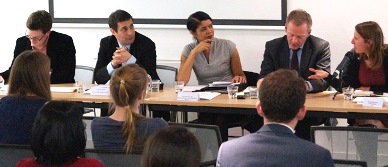
Expert panel
Chair: Chi Onwurah MP, engineer and Shadow Minster for Innovation & Science
Panel: Dr Evan Harris (former Liberal Democrat MP for Oxford West and Abingdon, writer on science policy), Dr Phillip Lee MP (Conservative MP for Bracknell, member of Energy and Climate Change Select Committee, and Chair of the All-Party Parliamentary Environment Group), Dr Jennifer Rohn (Cell biologist, novelist and founder and Chair of Science is Vital), Dr Jack Stilgoe (Lecturer in Social Studies of Science, science and technology policy expert and blogger)
Many thanks to Haralambos Dayantis for his work putting together this event.
Further information
For a review of the debate, see our Twitter, Blogs and Podcasts:
Do we need more scientists in Parliament? Haralambos Dayantis blogs about the Society of Biology's upcoming debate on 'do we need more scientists in Parliament?
Podcast: #policylates debates – do we need more scientists in Parliament?
Podcast: views after the #policylates debate
Jack Stilgoes blog - Should there be more scientists in Parliament?
British Ecology Society blog - Do we need more scientists in policy? An initial resounding 'yes' becomes a more complex debate
The debate continues...
Do we need more scientists in Parliament? They may not make any difference
Interested in Science Policy?
Learn more at NERC's publication Science into Policy, and the Campaign for Science and Engineering's Engaging with Policy guide on Learned Societies.



